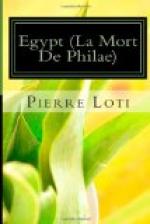In all the surrounding country which we command from this spot there is no indication of the present day; only here and there, amongst the palm-trees, the villages of the field labourers, whose houses of dried earth can scarcely have changed since the days of the Pharaohs. Our contemporary desecrators have up till now respected the infinite desuetude of the place, and, for the tourists who begin to haunt it, no one yet has dared to build a hotel.
Slowly the sun descends; and behind us the granites of the town-mummy seem to burn more and more. It is true that a slight shadow of a warmer tint, an amaranth violet, begins to encroach upon the lower parts, spreading along the avenues and over the open spaces. But everything that rises into the sky—the friezes of the temples, the capitals of the columns, the sharp points of the obelisks—are still red as glowing embers. These all become imbued with light and continue to glow and shed a rosy illumination until the end of the twilight.
It is a glorious hour, even for the old dust of Egypt, which fills the air eternally, without detracting at all from its wonderful clearness. It savours of spices, of the Bedouin, of the bitumen of the sarcophagus. And here now it is playing the role of those powders of different shades of gold which the Japanese use for the backgrounds of their lacquered landscapes. It reveals itself everywhere, close to and on the horizon, modifying at its pleasure the colour of things, and giving them a kind of metallic lustre. The phantasy of its changes is unimaginable. Even in the distances of the countryside, it is busy indicating by little trailing clouds of gold the smallest pathways traversed by the herds.
And now the disc of the God of Thebes has disappeared behind the Libyan mountains, after changing its light from red to yellow and from yellow to green.
And thereupon the tourists, judging that the display is over for the night, commence to descend and make ready for departure. Some in carriages, others on donkeys, they go to recruit themselves with the electricity and elegance of Luxor, the neighbouring town (wines and spirits are paid for as extras, and we dress for dinner). And the dust condescends to mark their exodus also by a last cloud of gold beneath the palm-trees of the road.
An immediate solemnity succeeds to their departure. Above the mud houses of the fellah villages rise slender columns of smoke, which are of a periwinkle-blue in the midst of the still yellow atmosphere. They tell of the humble life of these little homesteads, subsisting here, where in the backward of the ages were so many palaces and splendours.
And the first bayings of the watchdogs announce already the vague uneasiness of the evenings around the ruins. There is no one now within the mummy-town, which seems all at once to have grown larger in the silence. Very quickly the violet shadow covers it, all save the extreme points of its obelisks, which keep still a little of their rose-colour. The feeling comes over you that a sovereign mystery has taken possession of the town, as if some vague phantom things had just passed into it.




